List of Universities which offer class subjects under JICA-DSP (*)
- *Development Studies Programs Offered by Various Universities
as of April 25, 2023
Academic Area (1) “Politics, Law” and (2) “Economics”
The University of Tokyo (Graduate School of Public Policy)
The objective of MPP/IP is to produce public policy professionals who possess a global perspective and are capable of performing effectively in international policy environments.
Our curriculum has two main policy streams: Economic Policy, Finance and Development (EPFD) and Public Management and International Relations (PMIR). In order to complete MPP/IP, students are required to obtain at least 46 credits including one 2-credit compulsory course and other 2 credits from the designated course list.
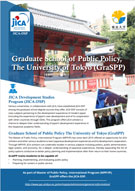
Hitotsubashi University (School of International and Public Policy)
Students will experience the simulation of the process of industrialization and modernization of a country through the program. By understanding the various problems that occur in the process of modernization and learning the history of the success and failure of political responses to such problems, international students from developing countries in particular will be able to picture the modernization process of their home countries and their strategies profoundly. Students could also witness how Japan engaged in international cooperation starting while still being an aid recipient, and eventually playing a bigger part in global governance.
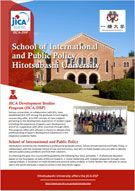
National Graduate Institute for Policy Studies (GRIPS) (GRIPS Global Governance Program (G-cube))
GRIPS Global Governance Program is a doctoral program in policy studies with the purpose to equip future “Leader of leaders” with both leadership to manage people from various backgrounds, and professional knowledge in social science studies including development studies. All lectures, exams and papers are done in English.
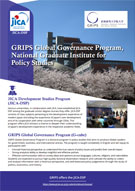
Kyoto University (Graduate School of Economics)
This course is designed to provide students with a critical and practical opportunity to learn about Japan's international development assistance and the history and current state of industrial policy and economic development in the Asia Pacific region, including Japan, from an international comparative perspective with international students from a variety of countries and regions. By doing so, it is hoped that the students will become top leaders who, after returning to their home countries in the future, will play a central role in developing countries' policy making and administration based on Japan's development experience.
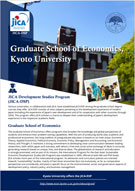
Yamaguchi University (Graduate School of Economics)
This course accepts international students from Asia and Africa. There are many students from Central and Local governments in the home country, and after returning home, it is expected to contribute to the socio-economic development of the country of origin. Yamaguchi has a history of producing many human resources who supported the modernization of Japan as a place of Meiji Restoration, and international students are encouraged to learn their experiences and knowledge.
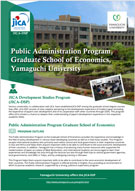
International University of Japan (Graduate School of International Relations, Graduate School of International Management)
Japan-Global Development program (JGDP) is a joint program of the master's program at the GSIR and the master's program at the GSIM, provides opportunities to learn universal development and growth logic across politics, economy, and management, with Japan's economic development and corporate growth as the main case materials.
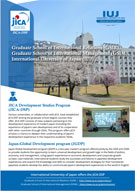
Ritsumeikan University (Graduate School of Economics)
With an awareness of the perspective from Kansai region other than Tokyo and unique geographical conditions of our campuses located in Kyoto and Shiga, we offer lectures about historical changes, current status and issues of economy, society and culture of this region in this program while considering them as a part of Japan's development process.
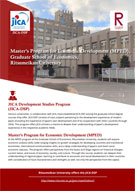
Rikkyo University (Graduate School of Business)
Master of Public Management and Administration Course is a new program launched in September 2016. It is designed particularly for mid-career public officers to nurture and develop their capacities to review, formulate, manage, and evaluate policies and programs effectively to become leaders in the governmental and the non-governmental sectors.
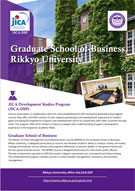
Academic Area (3) “Social Development”
Hokkaido University (Graduate School of Environmental Science)
Japan had suffered from severe environmental problems such as pollutions during high economic growth period. Currently we reached highest environmental standard in the world. We aim to foster leaders in the field of environmental science and administration by providing education on history of environmental field in Japan, environmental law, restoration techniques, process of environmental administration, and current method of environmental management.
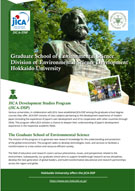
Hokkaido University (Graduate School of Engineering, Graduate School of Agriculture, GraduateSchool of Global Food Resources, Graduate School of Health Sciences)
This program introduces students to modernization and development projects implemented in Japan since the Meiji era (the 19th century) in disaster prevention, national land development, agriculture, public health, resource development and environmental conservation, with an emphasis on those implemented in Hokkaido. The latest trends are also discussed. Specifically, students will take the following subjects offered by the Graduate Schools of Engineering, Agriculture, Global Food Resources, and Health Sciences.
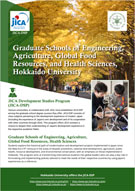
Tohoku University (WISE Program for Sustainability in the Dynamic Earth)
Name of the Program: “Disaster Risk Reduction (DRR) Leaders Capacity Development for the Sendai Framework Implementation”
“Disaster Risk Reduction (DRR) Leaders Capacity Development for the Sendai Framework Implementation” is targeted at future leaders in the field of DRR in developing countries, and aiming to foster DRR leaders well-versed in Japanese experiences including Sendai Framework.
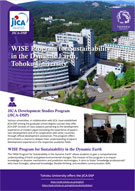
Yokohama National University (Graduate School of Urban Innovation)
The objective of the program is to learn fundamental and sufficient knowledge and attitudes on how to study the practical issues related to urban infrastructure (mainly in transport related field) through plenty of case studies, and to be able to propose countermeasures to tackle with current urban problems in Japan and Asian developing countries.
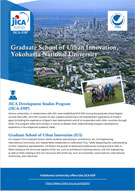
University of Tsukuba (Graduate School of Humanities and Social Sciences)
The human resource development objective of the Graduate School of Humanities and Social Sciences is to help build a solid foundation of specialized knowledge and skills that fit the challenges of the globalized world. We adopt a wide-scoped multi-disciplinary approach corresponding to the needs of rapidly changing regions of the world. Particularly, the program offers classes on Japanese economic history and on Japanese financial history and banking system, among others, which would provide students with a framework for comparative analyses.
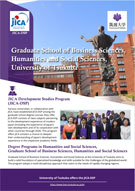
Nagoya University (Graduate School of International Development (GSID), Graduate School of Law, Graduate School of Bioagricultural Sciences, Graduate School of Environmental Studies, Graduate School of Engineering)
In addition to comprehensive study in the Politics/Law Area, Economics Area, Social Development Area, or Science and Technology/Innovation Area, students will also acquire broad knowledge in other areas of specialization. Beginning with the cultivation of individuals who can serve as top leaders to engage in the future national development in developing countries, the program aims to cultivate individuals who will promote development in each field related to their respective areas of specialization.
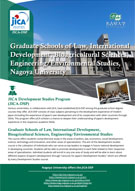
Kyoto University (Graduate School of Engineering, Graduate School of Agriculture, Graduate School of Management, Graduate School of Global Environmental Studies, Graduate School of Energy Science)
Education program for the cultivation of human resources contributing to sustainable development in developing countries [Social Development].
This program aims to build human capacities as future leaders who can design mutual development in the both Japan and developing countries based on the Japanese experiences on the international cooperation. This education program is re-constructed by existing Master Programs in Kyoto University in terms of sustainable development as a major issue.
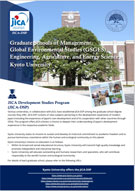
Kobe University (Graduate School of International Cooperation Studies (GSICS))
This program provides the insights to learn and understand the Japanese development experience and the role of Japanese ODA in developing countries by taking 2 courses equal to 4 credits, or more. It aims at providing the knowledge base to the students so that after completing the program, they can formulate an appropriate development policy and play a central role in implementing it in their home countries, using the Japan's development experience as a reference.
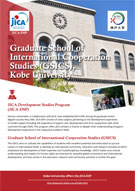
Hiroshima University (Graduate School of Humanities and Social Sciences / Graduate School of Advanced Science and Engineering)
This program will offer JICA scholarship students with an opportunity to learn economic and technological development, politics and government system, and education and culture of Japan from historical perspective, in collaboration with JICA (Japan International Cooperation Agency). JICA scholarship students are required to take at least 2 subjects, among which a common subject is mandatory. Upon successful completion, students will be given a certificate of completion of JICA-DSP program.
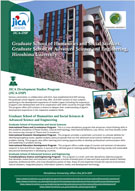
Naruto University of Education (Graduate School of Education)
In order to improve the quality of education in developing countries, this program considers educational policies and curriculum, teaching materials, teaching methods, school management, etc. of each country referring to educational experiences and practices in Japan. The goal is to develop human resources who can formulate improvement policies.
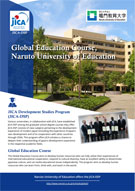
Kyushu University (Graduate School of Humanities)
This program of "Understanding Japan" targets mainly the international students from developing countries including JICA Scholarship and MEXT scholarship to disseminate the systematic knowledge on Japan's experience of development and to deepen understanding of different cultures.
This program is an additional program to degree program of various graduate school in Kyushu University and offers Japanese perspective on development history of science, technology and society in Japan. And it also offers Japan's experience on official development assistance (ODA).
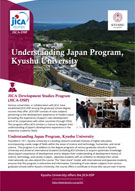
Toyo University (Graduate School of Global and Regional Studies)
Based on the fields such as economics, sociology, engineering, political science, and anthropology, the course nurtures individuals with specialized knowledge and skills who are capable of solving various regional challenges on-site and bringing out and enhancing the attractiveness of the regions. Our students explore fields related to community development and regional development, aiming to pursue “regional development” that utilize the characteristics and resources of the regions while maintaining harmony with the natural environment.
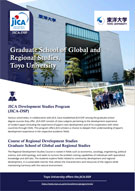
Toyo University (Graduate School of Economics)
This course is the only master program in the world that specializes in Public-Private Partnership (PPP). PPP is a general term for methods that provide public services and improve social infrastructure not only by the government but also by the cooperation of private companies, NPOs / NGOs, and citizens. Demand for new infrastructure development and renewal investment is increasing worldwide. However, expectations for PPP are rising because the portion that can be covered by the financial funds and ODA is shrinking.
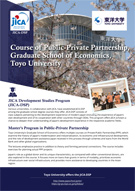
Waseda University (Graduate School of Asia-Pacific Studies)
This program is designed to offer the understanding of 150 years history of Japanese “Experiences in International Cooperation" and “Development Experiences” from “Meiji Restoration” to students from developing countries.
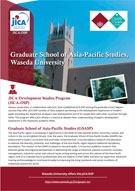
Ritsumeikan University (Graduate School of International Relations)
JICA-DSP provides students opportunities to learn Japanese economy, society, culture, and related issues in the process of Japan’s modern development. This program enables students to understand Japan systematically and effectively utilize their knowledge for economic and social development in their home countries, not only from a perspective of urban development but also with a view of regional and rural development.
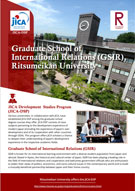
Ryukyu University (Graduate School of Health Sciences)
The Graduate School of Health Sciences aims to train leaders and researchers with a high degree of research capacities in the field of health sciences. Our graduate school consists of two educational research fields, “International Island Health” and “Human Health Development” which conduct unique educational research regarding health related states and the longevity on Okinawa, the physical, psychosocial and cultural factors that influence health, the development of health resources and advanced healthcare technology, and island health in Asia-Pacific region.
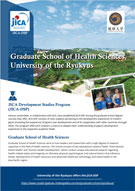
Sophia University (Graduate School of Human Sciences)
In our program, we focus on policies and challenges related to educational development in developing countries (and Japan). In each course, we examine the history and current educational policies and practices in Japan, ranging from the process of modernization to the post-World War II reconstruction period and up to the present day, in comparison with international trends and experiences in other countries. By providing the opportunity to gain comparative perspectives, we aim to foster leaders who can contribute to educational development in developing countries.
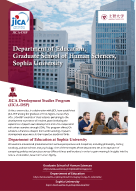
Academic Area (4) “Science and Technology, Innovation”
Obihiro University of Agriculture and Veterinary Medicine (Graduate School of Animal Husbandry)
Through this program, students understand the development of agriculture and related productivity improvement in Japan; more specifically, the history of farmland development, soil improvement, productivity improvement, varietal improvement and development, and the consolidation of distribution and sales.
As a result, they acquire the capability to solve problems in the agricultural sector in their own country.
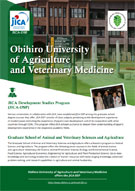
Hokkaido University (Graduate School of Infectious Diseases)
The aim of this program of “Advanced and Comprehensive Studies on Zoonosis Control” is to cultivate competence in analyzing the occurrence of the zoonotic diseases, evaluating the risk, developing and proposing countermeasures for the prevention of zoonosis, and conducting education and research on zoonosis.
In the future, the students are expected to become an expert in zoonotic disease control and a central figure in the field of infectious disease outbreaks in developing countries.
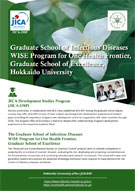
Tohoku Universities (Graduate School of Environmental Studies)
Our program fosters a comprehensive way of thinking that is crucial for international environmental leaders. The program seeks to equip students with a sense of internationalism, practical know-how, management capability, and the individual leadership and group-minded orientations inherent in strategic planning.
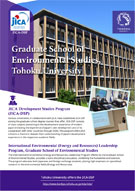
Akita University (Graduate School of International Resource Sciences)
The Graduate School of International Resource Sciences was established to cultivate specialists with wide-ranging knowledge in fields from earth science to resource development and environmental conservation. Students will pursue studies at the leading edge of their disciplines in the fields of (1) Resource and Earth Sciences and (2) Resource Development in order to gain the expertise required to operate as global leaders with advanced knowledge of Environmental Science working towards a sustainable society.
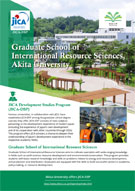
University of Tsukuba (Graduate School of Life and Environmental Sciences)
The aim of this program is to develop capacity and leadership through on-the-job training (OJT). The University of Tsukuba seeks students who are interested to study in the area of agriculture, food processing, agricultural economics, applied biochemistry and aim to develop leading edge technology to solve the current problems of agricultural research throughout the world.
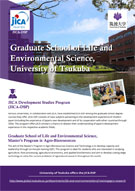
Toyohashi University of Technology (Graduate School of Engineering)
In this program, the excellent experts of our university and Japanese leading companies from variety of fields in engineering impart to the engineering students knowledge of superior industry technologies in Japan. Students learn advantages and its contributing factors of Japanese industrial technologies.
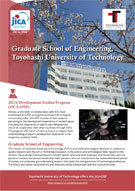
Nagasaki University (Graduate School of Biomedical Sciences/Infection Research)
The Graduate School of Biomedical Sciences at Nagasaki University has established a new educational program that aspires to train the next generation of global leaders in emerging communicable disease control. This program aims to provide young professionals with the knowledge and skills necessary to oversee the control of tropical infectious diseases at both the national and international levels.
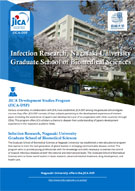
Nagasaki University (Graduate School of Biomedical Sciences/Disaster and Radiation Medical Sciences Joint Course)
The aim of the program is to understand the development of radiation medical sciences in Japan and mental health, radiation risk evaluation and risk communication, as well as the basic knowledge of radiation biological science, radiation protection, radiation health effects.
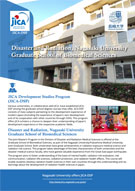
Ehime University (Graduate School of Agriculture)
The “program of advanced human resource development related to international agriculture, forestry and fisheries” aims to foster global leaders. To come to fruition, the program provides several subjects, developing understanding about issues of domestic and overseas agriculture, forestry and fisheries, improving solution methods to various issues and obtaining skills related to field study.
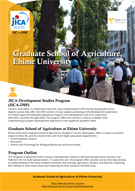
List of Partner Universities (Universities participating in JICA-DSP)
As of October, 2023
103 Universities in total
| Name of University |
|---|
| Obihiro University of Agriculture and Veterinary Medicine |
| Hokkaido University |
| Iwate University |
| Tohoku University |
| Akita University |
| Yamagata University |
| Ibaraki University |
| Utsunomiya University |
| Saitama University |
| Chiba University |
| Yokohama National University |
| University of Yamanashi |
| Niigata University |
| University of Tsukuba |
| Nagaoka University of Technology |
| The Graduate University for Advanced Studies |
| The University of Tokyo |
| Tokyo Medical and Dental University |
| Tokyo University of Foreign Studies |
| Tokyo Institute of Technology |
| Tokyo University of Agriculture and Technology |
| Hitotsubashi University |
| National Graduate Institute for Policy Studies |
| Tokyo University of Marine Science and Technology |
| Tokyo University of Science |
| Kanazawa University |
| University of Fukui |
| Gifu University |
| Shizuoka University |
| Nagoya University |
| Nagoya Institute of Technology |
| Mie University |
| Toyohashi University of Technology |
| Kyoto University |
| Kyoto Institute of Technology |
| Osaka University |
| Kobe University |
| Tottori University |
| Shimane University |
| Okayama University |
| Hiroshima University |
| Yamaguchi University |
| Tokushima University |
| Kagawa University |
| Ehime University |
| Kochi University |
| Naruto University of Education |
| Kyushu University |
| Kyushu Institute of Technology |
| Saga University |
| Nagasaki University |
| Kumamoto University |
| Oita University |
| University of Miyazaki |
| Kagoshima University |
| University of the Ryukyus |
| Yokohama City University |
| University of Niigata Prefecture |
| Tokyo Metropolitan University |
| The University of Kitakyushu |
| Ashikaga University |
| International University of Japan |
| Kitasato University |
| Keio University |
| Kogakuin University |
| Shibaura Institute of Technology |
| Juntendo University |
| Sophia University |
| Chuo University |
| Tokai University |
| Tokyo University of Agriculture |
| Toyo University |
| Hosei University |
| Tokyo City University |
| Meiji University |
| Rikkyo University |
| Waseda University |
| St. Luke's International University |
| Teikyo University |
| Graduate School of Management, GLOBIS University |
| Nagoya University of Commerce & Business |
| Kanazawa Institute of Technology |
| Doshisha University |
| Ritsumeikan University |
| Ryukoku University |
| Kansai University |
| Kwansei Gakuin University |
| Kobe Institute of Computing; Graduate School of Information Technology |
| University of East Asia |
| Ritsumeikan Asia Pacific University |
| The University of Electro-Communications |
| Kitami Institute of Technology |
| Rakuno Gakuen University |
| Shinshu Universiy |
| Ishikawa Prefectural University |
| Nihon University |
| Tokyo International University |
| Nara Institute of Science and Technology |
| Prefectural University of Hiroshima |
| Kochi University of Technology |
| Osaka Metropolitan University |
| Hirosaki University |
| The University of Aizu |




scroll